Abstract
This paper describes the employment experience of 266 individuals one year after traumatic injury severe enough to require hospitalization. Of those working full-time prior to their injury, 56 per cent were employed full-time at one year; an additional 5 per cent were working part-time. Those sustaining a severe head or spinal cord injury were at highest risk of not returning to work (only 43 per cent and 21 per cent, respectively, had returned within the year). Low one-year employment rates (58 per cent) were also noted for individuals whose most severe injury was to one or more extremities. The extent and rate of return to work was examined in relation to selected socioeconomic and personal characteristics. Findings indicate that after controlling for type and severity of injury, personal income, and educational level of the injured person, as well as the identification of a strong social network as defined by the presence of one or more confidants, were important correlates of post-injury employment status.
Full text
PDF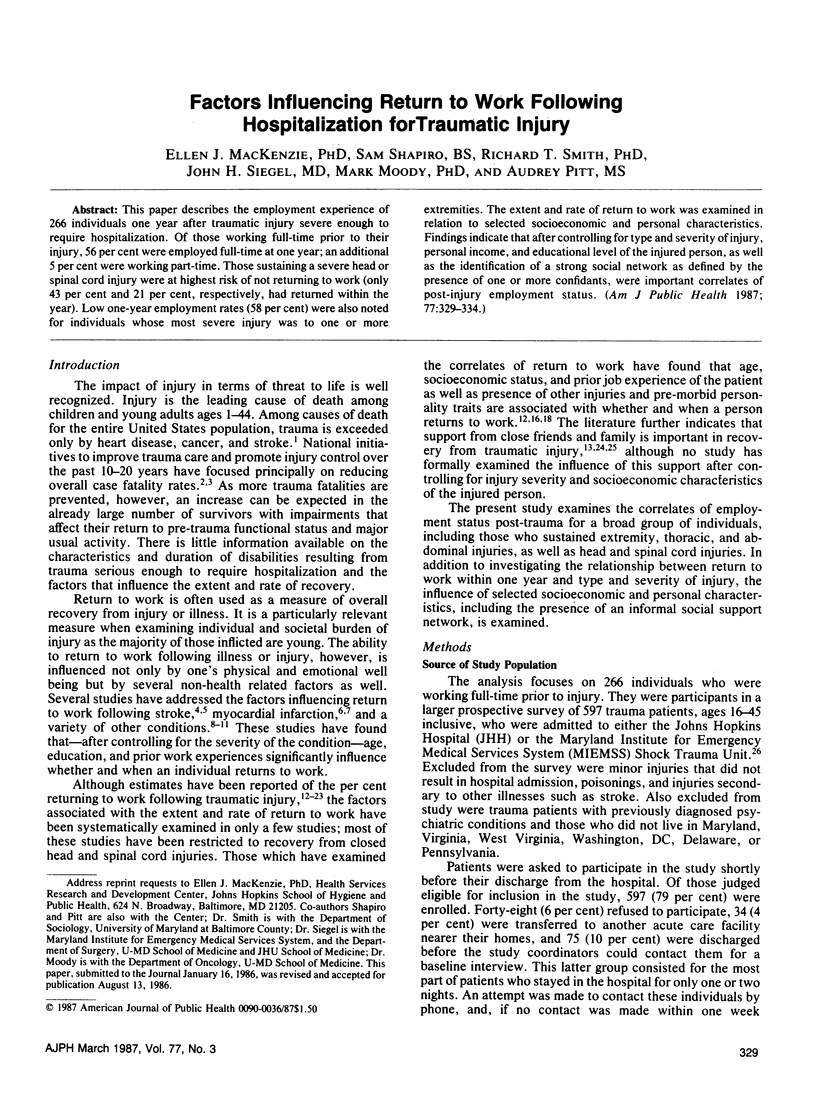
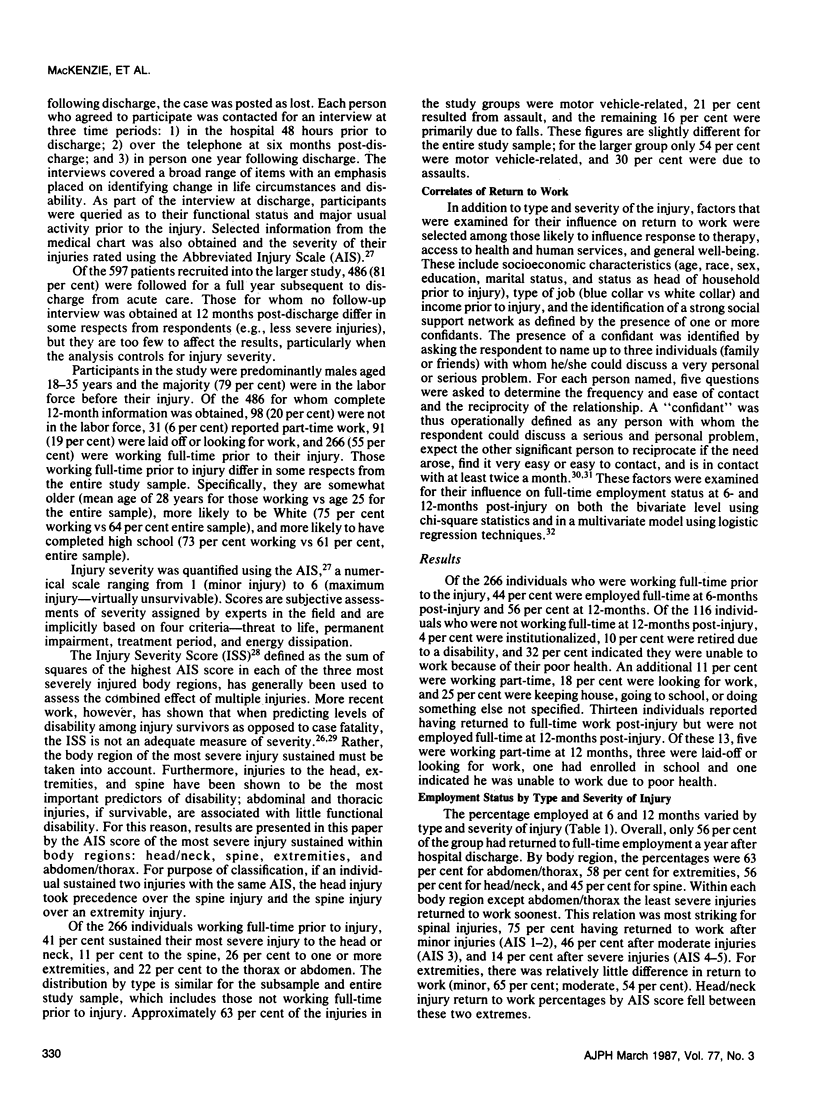
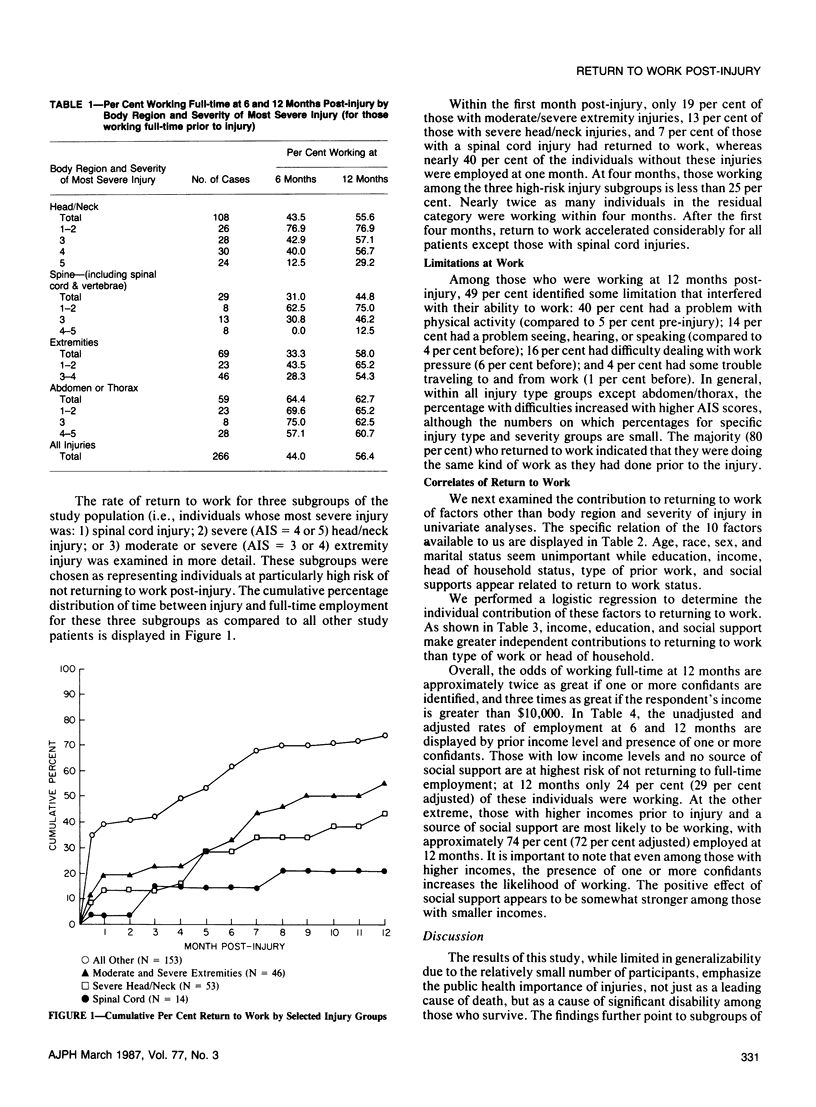
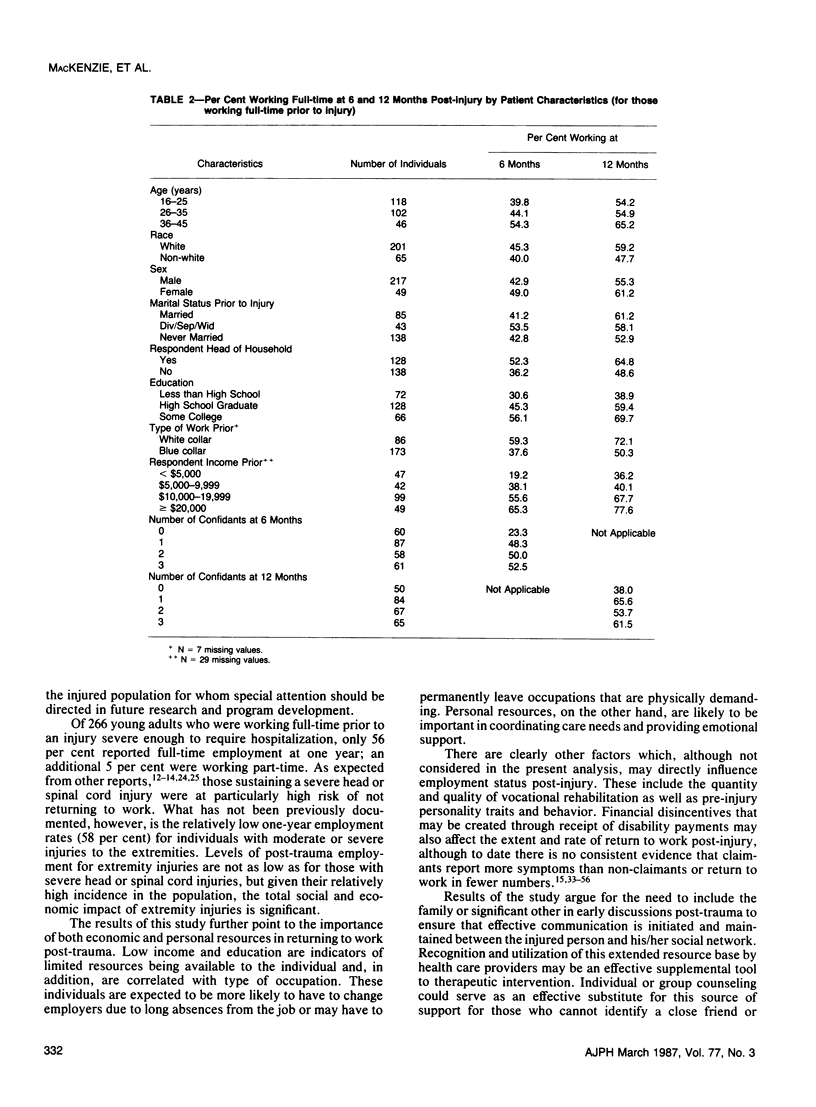
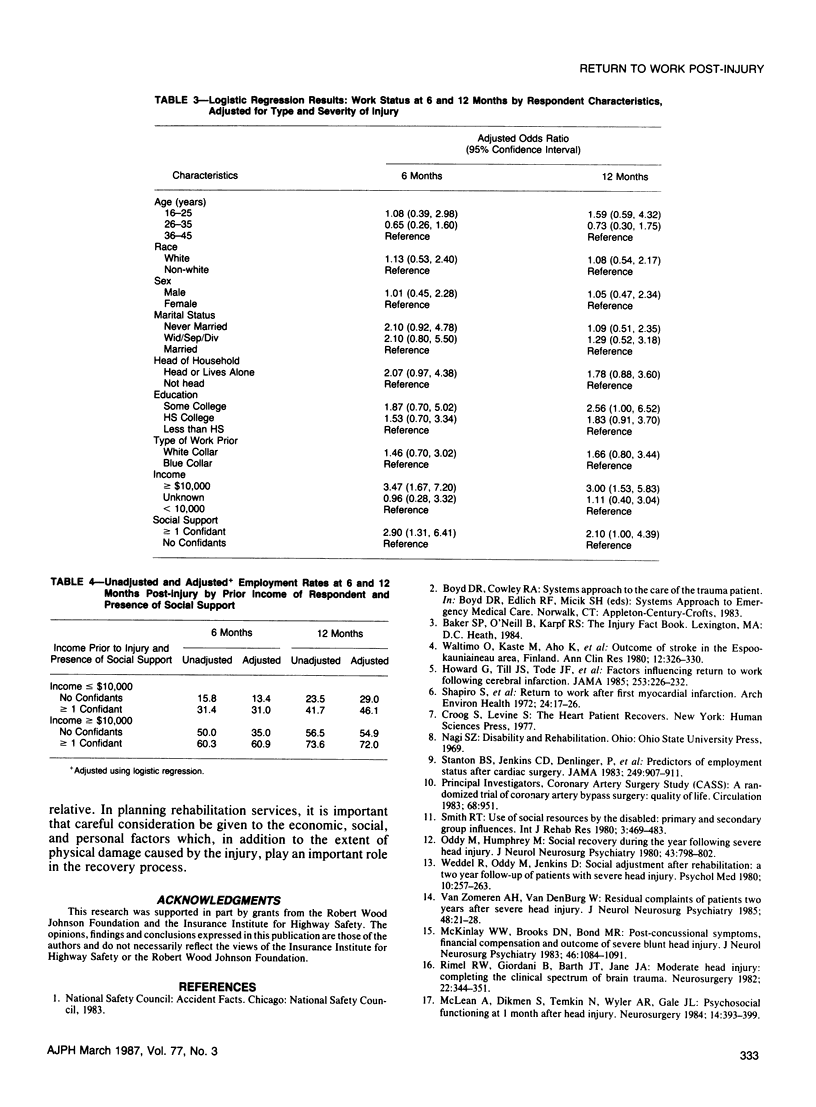
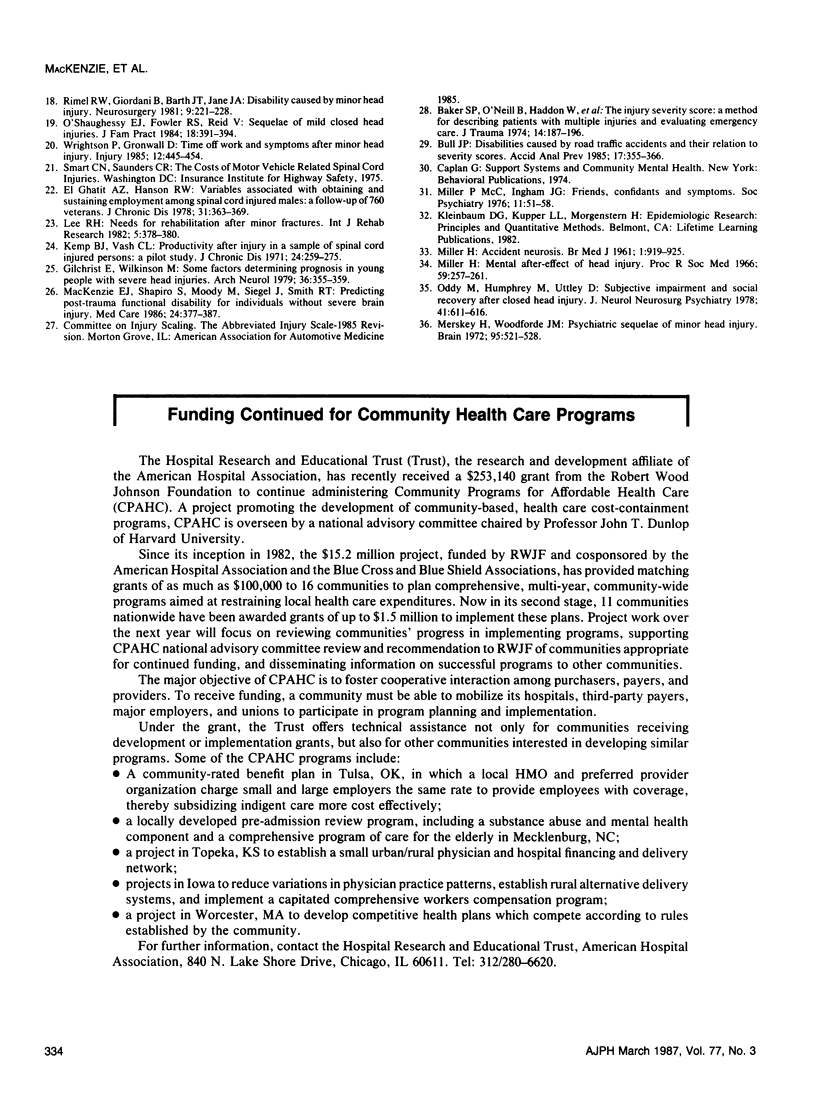
Selected References
These references are in PubMed. This may not be the complete list of references from this article.
- Baker S. P., O'Neill B., Haddon W., Jr, Long W. B. The injury severity score: a method for describing patients with multiple injuries and evaluating emergency care. J Trauma. 1974 Mar;14(3):187–196. [PubMed] [Google Scholar]
- El Ghatit A. Z. Variables associated with obtaining and sustaining employment among spinal cord injured males: a follow-up of 760 veterans. J Chronic Dis. 1978;31(5):363–369. doi: 10.1016/0021-9681(78)90053-x. [DOI] [PubMed] [Google Scholar]
- Evans W. A., Courtney A. J. An analysis of accident data for franchised public buses in Hong Kong. Accid Anal Prev. 1985 Oct;17(5):355–366. doi: 10.1016/0001-4575(85)90089-2. [DOI] [PubMed] [Google Scholar]
- Gilchrist E., Wilkinson M. Some factors determining prognosis in young people with severe head injuries. Arch Neurol. 1979 Jun;36(6):355–359. doi: 10.1001/archneur.1979.00500420065008. [DOI] [PubMed] [Google Scholar]
- Howard G., Till J. S., Toole J. F., Matthews C., Truscott B. L. Factors influencing return to work following cerebral infarction. JAMA. 1985 Jan 11;253(2):226–232. [PubMed] [Google Scholar]
- Kemp B. J., Vash C. L. Productivity after injury in a sample of spinal cord injured persons: a pilot study. J Chronic Dis. 1971 Jul;24(4):259–275. doi: 10.1016/0021-9681(71)90078-6. [DOI] [PubMed] [Google Scholar]
- MacKenzie E. J., Shapiro S., Moody M., Siegel J. H., Smith R. T. Predicting posttrauma functional disability for individuals without severe brain injury. Med Care. 1986 May;24(5):377–387. doi: 10.1097/00005650-198605000-00001. [DOI] [PubMed] [Google Scholar]
- McKinlay W. W., Brooks D. N., Bond M. R. Post-concussional symptoms, financial compensation and outcome of severe blunt head injury. J Neurol Neurosurg Psychiatry. 1983 Dec;46(12):1084–1091. doi: 10.1136/jnnp.46.12.1084. [DOI] [PMC free article] [PubMed] [Google Scholar]
- McLean A., Jr, Dikmen S., Temkin N., Wyler A. R., Gale J. L. Psychosocial functioning at 1 month after head injury. Neurosurgery. 1984 Apr;14(4):393–399. doi: 10.1227/00006123-198404000-00001. [DOI] [PubMed] [Google Scholar]
- Merskey H., Woodforde J. M. Psychiatric sequelae of minor head injury. Brain. 1972;95(3):521–528. doi: 10.1093/brain/95.3.521. [DOI] [PubMed] [Google Scholar]
- Miller H. Mental after-effects of head injury. Proc R Soc Med. 1966 Mar;59(3):257–261. doi: 10.1177/003591576605900327. [DOI] [PMC free article] [PubMed] [Google Scholar]
- O'Shaughnessy E. J., Fowler R. S., Jr, Reid V. Sequelae of mild closed head injuries. J Fam Pract. 1984 Mar;18(3):391–394. [PubMed] [Google Scholar]
- Oddy M., Humphrey M. Social recovery during the year following severe head injury. J Neurol Neurosurg Psychiatry. 1980 Sep;43(9):798–802. doi: 10.1136/jnnp.43.9.798. [DOI] [PMC free article] [PubMed] [Google Scholar]
- Oddy M., Humphrey M., Uttley D. Subjective impairment and social recovery after closed head injury. J Neurol Neurosurg Psychiatry. 1978 Jul;41(7):611–616. doi: 10.1136/jnnp.41.7.611. [DOI] [PMC free article] [PubMed] [Google Scholar]
- Rimel R. W., Giordani B., Barth J. T., Boll T. J., Jane J. A. Disability caused by minor head injury. Neurosurgery. 1981 Sep;9(3):221–228. [PubMed] [Google Scholar]
- Rimel R. W., Giordani B., Barth J. T., Jane J. A. Moderate head injury: completing the clinical spectrum of brain trauma. Neurosurgery. 1982 Sep;11(3):344–351. doi: 10.1227/00006123-198209000-00002. [DOI] [PubMed] [Google Scholar]
- Shapiro S., Weinblatt E., Frank C. W. Return to work after first myocardial infarction. Arch Environ Health. 1972 Jan;24(1):17–26. doi: 10.1080/00039896.1972.10666045. [DOI] [PubMed] [Google Scholar]
- Smith R. T. Use of social resources by the disabled: primary and secondary group influences. Int J Rehabil Res. 1980;3(4):469–483. doi: 10.1097/00004356-198012000-00001. [DOI] [PubMed] [Google Scholar]
- Stanton B. A., Jenkins C. D., Denlinger P., Savageau J. A., Weintraub R. M., Goldstein R. L. Predictors of employment status after cardiac surgery. JAMA. 1983 Feb 18;249(7):907–911. [PubMed] [Google Scholar]
- Waltimo O., Kaste M., Aho K., Kotila M. Outcome of stroke in the Espoo--Kauniainen area, Finland. Ann Clin Res. 1980 Dec;12(6):326–330. [PubMed] [Google Scholar]
- Weddell R., Oddy M., Jenkins D. Social adjustment after rehabilitation: a two year follow-up of patients with severe head injury. Psychol Med. 1980 May;10(2):257–263. doi: 10.1017/s0033291700044019. [DOI] [PubMed] [Google Scholar]
- Wrightson P., Gronwall D. Time off work and symptoms after minor head injury. Injury. 1981 May;12(6):445–454. doi: 10.1016/0020-1383(81)90161-3. [DOI] [PubMed] [Google Scholar]
- van Zomeren A. H., van den Burg W. Residual complaints of patients two years after severe head injury. J Neurol Neurosurg Psychiatry. 1985 Jan;48(1):21–28. doi: 10.1136/jnnp.48.1.21. [DOI] [PMC free article] [PubMed] [Google Scholar]



